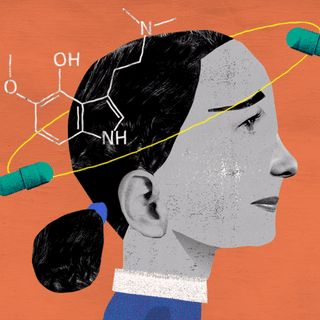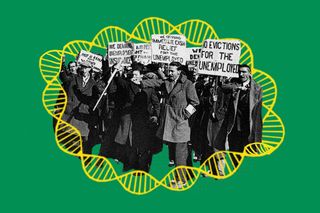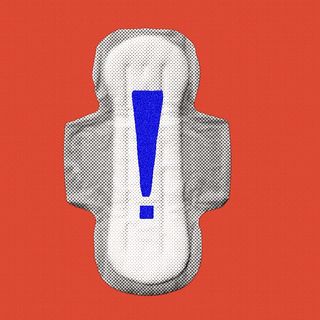
The Great Depression Changed People’s DNA, Study Finds
Children born during this time of recession showed genetic markers of accelerated aging.

People born in the United States between 1929 and 1939 — the period also known as ‘The Great Depression’ — had epigenetic markers of accelerated aging, according to a new study published in PNAS. In short, the phase of economic recession, marked by unemployment, financial instability, and a decreased quality of life, changed the DNA of children conceived during the time.
The epigenome is a set of markers that determines how genes express themselves in cells. Embryos develop on the basis of epigenetic tags attached to DNA, which are, in turn, determined by environment, diet, and hormones. In the present study, researchers found a set of markers that indicated the risk of chronic illness and early death. This “adds to a cache of studies indicating that exposure to hardship[s] such as stress and starvation during the earliest stages of development can shape human health for decades,” according to a Nature editorial.
The present study looked at 800 people born in the 1930s, across states that were hit differently by the recession. Among them, those who lived in states that were hit the hardest had markers that showed their cells looking older than they should. In contrast, people who were conceived in states that weren’t hit as hard didn’t have these markers as much.
We’ve known for a while that large-scale events can shape the health outcomes of future generations — but only a few studies of this kind involve humans. Ethical considerations mean that the only available subjects are those who have already been through such events in the past, according to Ainash Childebayeva, from the Max Plank Institute for Evolutionary Anthropology in Leipzig, Germany. That’s why “… these kinds of studies are really important because they highlight how early development matters for health and disease outcomes later in life,” she added.
Related on The Swaddle:
Parents’ Stress Passes to the Next Generation Before Kids Are Even Born
Epigenetics, as a field, has recently begun grappling with the implications of trauma for future generations. Take the Dutch famine in 1944, where a Nazi blockade led to 20,000 people in the Netherlands dying of starvation. People who were in utero during this famine — known as the Dutch Hunger cohort — died at higher rates as adults.
Researchers aren’t sure exactly how this happens, and it’s tricky to study it in more detail given that it would be unethical to subject a human being to adversity for the study. A previous study, conducted on worms, however, found that starvation of worms led to their passing on “the memory of starvation” to future generations. A process called “small RNA inheritance” was responsible for this — the worms responded to the starvation by producing specific starvation-induced small RNA, which specifically targeted genes involved in nutrition. These particular RNA were inherited by at least three further generations of the worms.
Even events like famines, then, impact the health outcomes of generations born or in utero during the famine — it impacts their metabolism and thereby increases their risk of diseases. The disease risk, moreover, pertains directly to nutrition and metabolism — diabetes, hyperglycemia, and obesity — due to carrying starvation-adapted genes. “Exposure to even one famine has a multi-generational effect of causing metabolic disorders including diabetes, hyperglycemia, and cardiovascular diseases. Imagine having an exposure to at least 24 major famines in a 50-year period,” Dr. Mubin Syed told HuffPost, explaining why South Asians, in particular, are predisposed to diabetes. “Our adaptation to scarce food availability is no longer suitable for our environment of food abundance,” he added.
Epigenetics also explains the concept of intergenerational trauma. It’s not so much the gene coding changing — it’s how genes are expressed. When the body adapts to stressors, it does so by turning on or off certain gene expressions. Children born to prisoners of war also showed higher mortality rates — interestingly, only sons showed these effects. And while researchers say that epigenetic inheritance of this kind is rare, a growing number of studies suggest it’s not insignificant.
Related on The Swaddle:
Another animal study that tried to establish RNA inheritance took RNA from mice that had been traumatized, and injected it into the embryos of mice whose parents were not traumatized. When born, the pups who received the RNA showed a stress response similar to the pups born to the traumatized mice.
This is a study that could show how emotional trauma carries over to future generations in humans too. Physiological responses to trauma are relatively easy to track and observe — but what of people who experienced trauma like forced separations, grief, or discriminatory violence?
At its core, epigenetics is a story of our collective responsibility toward the future. It provides a concrete link that ties our actions and experiences today to the fate of those who come next. It’s also a story of reproductive health and capacity building. During times of socio-economic or political upheaval, mothers and pregnant women are often hit hardest — with little to no state infrastructure to support them. “What we see from this study is that socio-economic structural inequalities that make it difficult for women to access the care they need might have long-term consequences,” said the present study’s co-author Lauren Schmitz, an economist at the University of Wisconsin-Madison.
Because the prenatal period is such a sensitive time in a person’s development, researcher advocate for more investments in early life to “postpone age-related morbidity and mortality and extend healthy life span.” But given how we’ve just been through a global pandemic, it also calls for more attention to be paid to policies that adversely impact people today.
Rohitha Naraharisetty is a Senior Associate Editor at The Swaddle. She writes about the intersection of gender, caste, social movements, and pop culture. She can be found on Instagram at @rohitha_97 or on Twitter at @romimacaronii.
Related


Many Popular Sanitary Pads in India Contain Cancer‑Causing Chemicals, Study Finds
